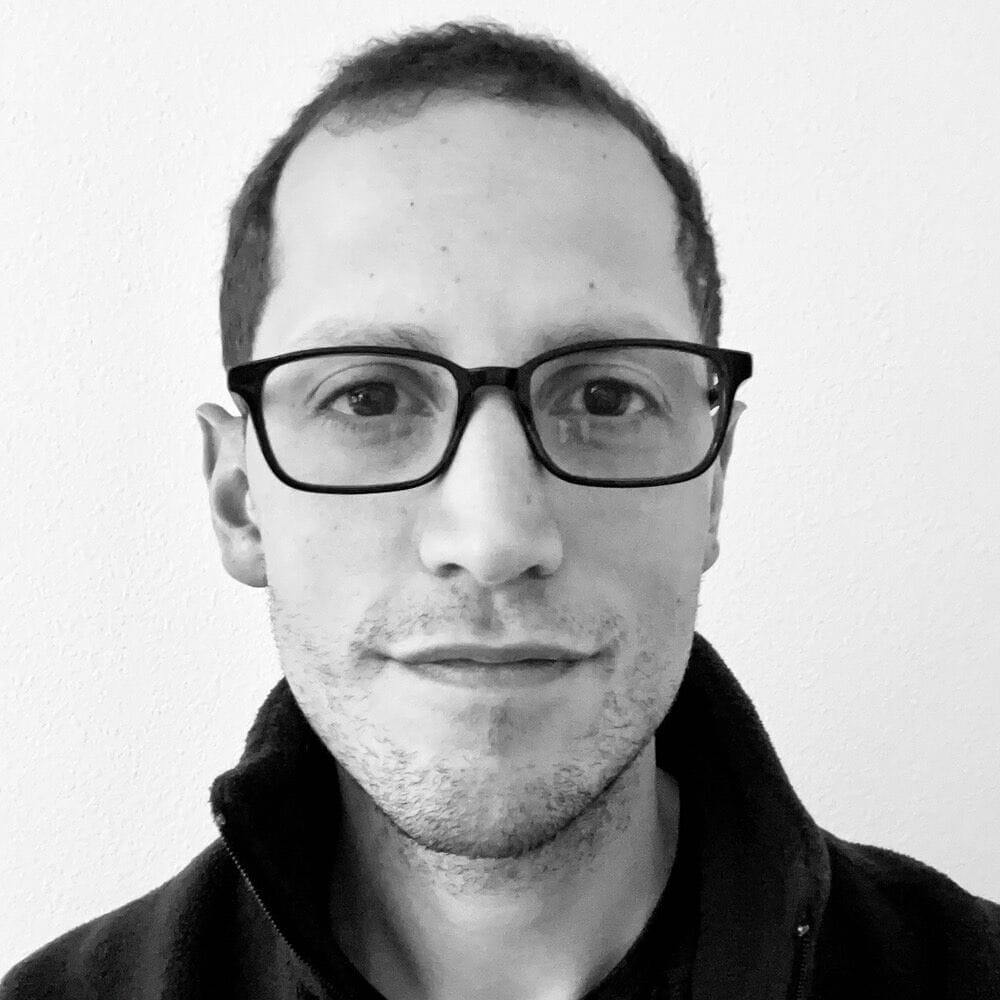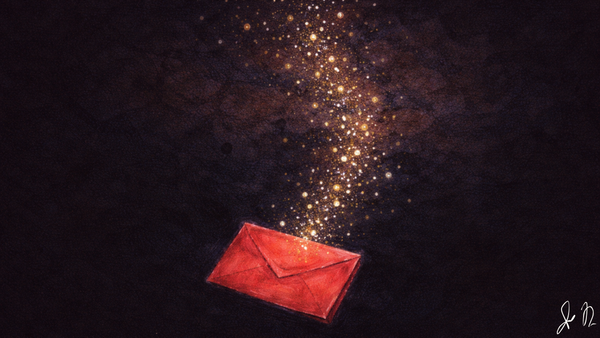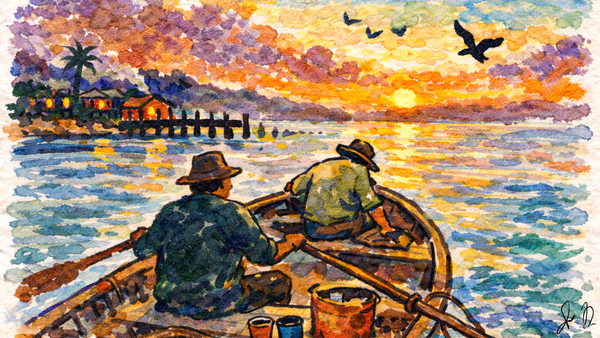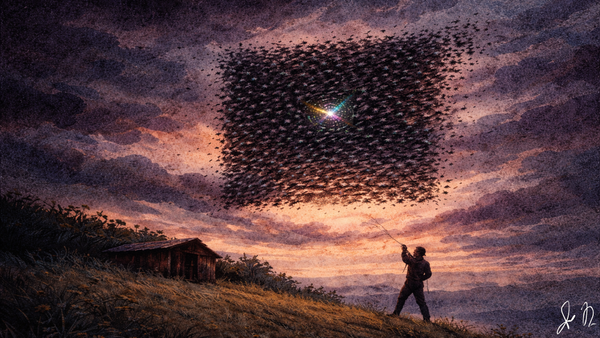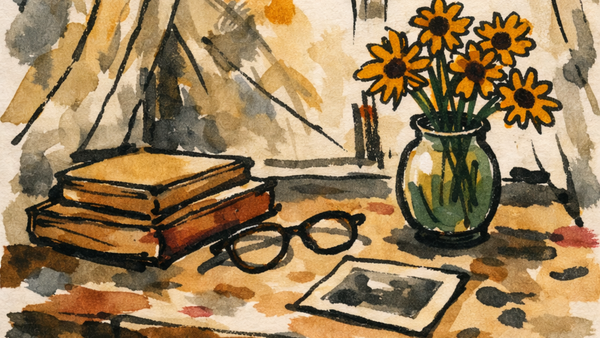The Blessing List
We went around the table saying what we were thankful for. No one said the truth.
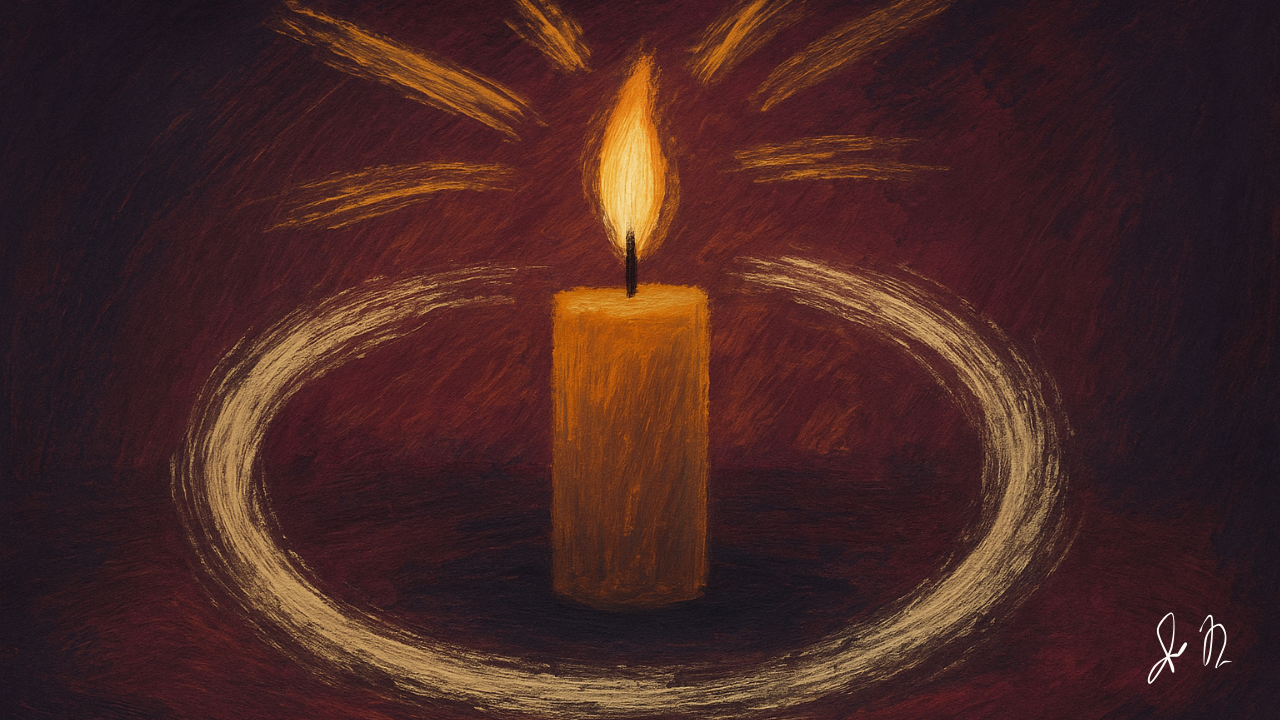
Every family, I sometimes think, keeps a little itch for disaster tucked under its Sunday clothes, a secret urge to push love until it comes out mean and true.
This year, my mother decided we were going to do Thanksgiving “properly.”
“None of this paper plate nonsense,” she announced in October, slapping a Williams-Sonoma catalog onto the kitchen counter. “God deserves my best.”
“What about us?” my sister, Ria, muttered.
“We can have the leftovers,” my dad said, not looking up from the game on his phone.
I was seventeen and scheduled my entire inner life around how much attention my mother was paying me at any given moment. That fall, she’d moved her spotlight from me to Jesus and Pinterest, in that order. It was a relief, sometimes. Enough times.
“Listen,” she said, jabbing a manicured finger at a picture of white candles in glass cylinders. “We’re going to go around the table and say what we’re thankful for. Properly. Not just ‘my family, my friends, my health’ like a dang robot. Think about it ahead of time. No one is going to embarrass me this year. Understood?”
“Yesss, Chef,” Ria said.
My mother swatted at her affectionately. “I mean it,” she told me, softening. “I want us to be intentional. Gratitude is holy, Luke.”
I nodded, already knowing what I was going to say.
I’m thankful that I finally know who I am.
I’m thankful that if you really mean this whole unconditional love thing, we’ll be fine.
At night, I rehearsed versions of it while brushing my teeth, foam creeping down my chin like a rabid dog. The words felt too big and too small at the same time, like a suit you grow into and then grow out of on the same day.
I must be crazy, I thought. Not in my mother’s airy, half-joking way, but in the plain sense. Who picks Thanksgiving dinner to come out to an entire extended family?
Me, apparently.
My mother did not have hobbies so much as extended phases, each of them devout and exhausting. There had been the Juice Cleanse Era (we still had the juicer, wedged behind the rice cooker), the Yoga Phase (she owned the mat, had never once unrolled it), and, most recently, Scripture Memorization Season, during which she had carefully lettered Bible verses on pastel index cards and taped them around the house—by the light switch, above the sink, over the toilet.
The latest phase was Gratitude.
“Not just saying thank you,” she explained to anyone who would listen, “but living thank you. It’s very different.”
She bought a copper-colored table runner with embroidered leaves and a set of “Give Thanks” napkin rings that pinched the cloth so tight it looked like the napkins were choking. She polished the good plates, the ones with the tiny chips she pretended not to see. She ordered a floral centerpiece online and then took credit for arranging it when it arrived.
My father, who rarely objected to anything that didn’t interfere with his TV schedule, let her have the whole production. He spent the week leading up to Thanksgiving rewinding and rewatching the same touchdown on YouTube, as if repetition might change the outcome.
“You can’t memorize football,” my mother informed him. “You should memorize blessings instead.”
“I’m memorizing this replay,” he said mildly. “Brings me joy.”
She rolled her eyes. “God is not impressed by your joy, Rajesh.”
“Good thing he doesn’t grade on a curve, then.”
Ria and I exchanged a glance over the dish rack, the kind that said: we will remember this line and use it against him later.
We weren’t a particularly big family, but we were dense, like something compacted over generations. There was my mother’s sister, “Auntie Jenny” (though she insisted on just “Jenny” with strangers), who wore lipstick two shades too young for her and posted “wine o’clock” memes in the family group chat. There was Uncle Sunil, her husband, who audited everyone’s life choices the way he audited spreadsheets. There were their twins, Priya and Neel, both twelve and permanently in a state of mild shock. My dad’s father, Dada, completed the circle, moving slowly and judging quickly.
We all lived within thirty minutes of each other in Raleigh, but we only met like this twice a year: Thanksgiving and Christmas Eve. Easter was reserved for church people, Diwali for the distant relatives on WhatsApp. The rest of the time, we were a group chat and the occasional forwarded article that began, “You should read this, it’s about your generation.”
Our family’s official religion was Christianity, but we practiced something closer to Reputation. Everything we did, we did in front of an imagined audience. This is important to keep in mind.
The day of Thanksgiving arrived exactly like my mother wanted it. Sky a clear, photogenic blue, air smelling faintly of chimney smoke. She had been up since six, basting and rotating and muttering to herself. By noon the entire house smelled like butter, garlic, and the impending arrival of judgmental people.
“Luke, get the chairs from the garage,” she called. “The extra ones.”
“In a minute,” I said, leaning against the counter, checking my phone for texts that weren’t coming. I’d told exactly one person at school that I liked boys, and he’d handled the revelation by transferring to a different lunch table.
“Not in a minute, now.” She snapped her fingers. “Don’t be lazy. Ask yourself, am I adding to the blessing or subtracting from it?”
“Ma,” I said, but I went.
Gratitude was not improving her mood, clearly.
In the dim garage, I pulled two folding chairs from behind a box labeled XMAS CRAP, my mind on the speech I’d planned. I’m thankful that I finally know who I am. In my head, I sounded calm, actually. Quite a bit serene. A little brave, maybe, in a cinematic way. In reality, my palms were slick and my left eye twitched whenever I thought the word “gay” in connection with my own body.
“You’re overthinking it,” Ria had told me the night before, when I’d finally blurted it to her in the hallway outside the bathroom. “Just say it like it’s no big deal. Honestly, everyone’s too obsessed with their own drama to care.”
“You’ll back me up?” I asked.
Her face did four things at once, and then she said, “Yeah, of course. Just don’t do it before we eat. I refuse to have my potatoes get cold.”
By five, the house was full. Auntie Jenny breezed in first, arms weighed down with grocery store pies and a tote bag that announced “GOOD VIBES ONLY,” a lie visible from space. She air-kissed my mother and whispered something in my father’s ear that made him choke on nothing.
Uncle Sunil followed at a slower pace, carrying a lasagna in a glass dish covered with foil. My mother took one look and said, “Lasagna? On Thanksgiving?”
“It’s vegetarian,” he said. “You can’t expect kids to just eat turkey.”
“I did,” my mother replied. “And look how I turned out.”
No one commented.
The twins drifted in behind them, already on their phones, one earbud each.
“Shoes off,” my mother reminded them, pointing to the shoe rack by the door.
“Aunty, I literally just put them on,” Neel protested.
“Then you get to practice taking them off,” she said. “Gratitude.”
Ria appeared in ripped black jeans and a sweater that said NO THANKS in pink letters. My mother gave her a look that contained a six-part sermon.
“What?” Ria said. “It’s comfortably big for a big meal.”
Dada came last, because my father had to go pick him up. He shuffled in wearing the same cardigan he’d worn to every event since 2003, clutching a cane he didn’t need.
“Happy Thanksgiving, Papa,” my mother said brightly, kissing his cheek.
He sniffed. “We did not have this holiday in Kolkata,” he said. “We had real festivals.”
“And yet you’re here,” she replied, still smiling.
“Free food,” he said. “And to see whether my son has become any smarter.”
My father grinned. “How could I?.”
By six, the table was ready. Plates laid out, napkins strangled by their rings, candles lit. The turkey sat in the center like a sacrificial animal in a glossy magazine spread. My mother had sprinkled it with parsley and something red she insisted was paprika, but I sincerely hoped it was chili powder.
“Everyone, gather,” she called, clapping her hands. “Phones away. We’re going to do the blessing.”
The blessing. My heart climbed into my throat and hung there like it was on a ledge.
We shuffled into place around the table. There were nine of us, so the circle was more of a self-conscious oval. My mother took my father’s hand on one side and Dada’s on the other. Dada took mine, his grip bony and unexpectedly strong.
“Do we have to hold hands?” Neel asked.
“Yes,” my mother said. “You won’t die. It’s symbolic.”
“Symbolic of what?” Priya wanted to know.
“Unity,” my mother said. “Support. That we carry each other’s burdens.”
“Like Jesus carrying the cross,” Ria added, deadpan.
“Yes,” my mother said, shooting her a warning look. “Exactly like that.”
I laced my fingers with Ria’s on one side, Dada’s on the other, and felt the circuit complete. Warm palms, faint sweat, Ria’s bracelet digging into my wrist. The candles flickered as we all exhaled.
“Okay,” my mother said. “I’ll start, and then we’ll go around. Just speak from your heart. Remember, we’re not here to perform. We’re here to be honest before God.”
I almost laughed. Not here to perform. Sure.
“I’m thankful,” my mother began, glancing upward as if God lived in the ceiling fan, “for the opportunity to serve all of you tonight. It is a privilege to cook for my family. Some people”—her voice sharpened—“don’t appreciate how much work goes into that. But God sees, and He strengthens me.”
I saw the word “some” land like a dart. It hit everyone and no one at once. That was her gift.
She went on. “I’m thankful for my children, that they are healthy and safe, that they are protected from bad influences and bad choices. I’m thankful they know right from wrong, even when they pretend they don’t. And I’m thankful”—she opened her eyes and looked directly at my father—“for a patient husband who puts up with me.”
Everyone laughed, gently shaken free from the little preaching hidden in her thanks. She was very good at it.
“Amen,” said Auntie Jenny.
“Amen,” my mother echoed, satisfied.
We all squeezed hands in a vague, confused rhythm before my father began.
“I’m thankful,” he said slowly, “for a wife who insists on doing things properly even when it drives me crazy. It means I don’t have to think about much.” The table chuckled. “I’m thankful for having my father here with me—” He nodded at Dada, who sniffed. “—and for this house staying in one piece despite the number of people slamming doors in it.”
His eyes slid over Ria and me. I felt my neck grow hot.
“I’m also thankful,” he added, “that we still talk to each other. Mostly. I know not every family has that.”
It was a gentle sentence, but it carried weight. He had grown up in a household where silence was more common than dust.
“Amen,” Auntie Jenny said again, softer.
Then it was Dada’s turn.
“I am thankful the turkey smells better than it looks,” he said.
Everyone laughed, relieved.
“I am thankful my son has more hair than his friends my age,” he added, making a show of peering at the top of my father’s head. “And that my grandchildren live close enough I can still lecture them in person instead of over the phone.”
“We’re thankful, too, Dada,” Ria said.
He smirked. “You are lying, but that is okay. Lying is better than nothing.”
The line landed oddly. For a second, the air felt thin. Then Auntie Jenny jumped in.
“Well,” she said, “I’m thankful for this family, obviously.” She flipped her hair over one shoulder, the way she always did before saying something she knew was going to land sideways. “I’m thankful that even though some of us are very busy and important—” She glanced at Uncle Sunil. “—we still make time to show up.”
Here we go, I thought.
“I’m thankful,” she continued, “that God has blessed us financially so we can afford nice things, like holidays and new cars and college tuitions.” Her smile sharpened. “And I pray that we all remember where those blessings come from, and don’t waste them on…impulsive decisions.”
She said “impulsive” like she really meant “criminal.” Or “liberal,” maybe.
“Jenny,” my mother said, voice light. “What a nice prayer.”
Ria squeezed my hand. I realized she was holding her breath.
Uncle Sunil cleared his throat. “I’m thankful,” he said, in the same flat tone he probably used at work, “that my family is healthy. That my kids are doing well in school.” He did not look at the twins as he said it. “I’m thankful that we have stability, that we don’t…er, run after every little trend.” His eyes flicked to Ria’s ripped jeans, then to the NO THANKS on her sweater. “A strong foundation matters.”
“We’re thankful for your foundation, too,” Ria murmured, barely loud enough for me to hear. If my mother heard, she pretended not to.
Priya went next. “I’m thankful for my dog,” she said.
“You don’t have a dog,” my mother reminded her.
“I know,” Priya said. “I’m thankful that someday I will.”
Everyone laughed, tension sliding off them like oil. Kids were good for that. They made everything look less dire.
“I’m thankful for my Nintendo Switch,” Neel said. “And this lasagna.”
“Neel,” his father warned.
“What?” Neel said. “I am.”
Everyone laughed again, grateful for something uncomplicated.
Then it was Ria’s turn. She took a breath. “I’m thankful,” she said, “that I got into NYU.”
My mother flinched. So did Auntie Jenny. We had spent the last month pretending Ria’s acceptance letter did not exist.
“I’m also thankful,” Ria went on, plowing through, “that I get to study what I actually care about, and not just what looks good on a résumé. And I’m thankful”—she looked at my parents—“that Mom and Dad raised me to think for myself, even when it’s inconvenient.”
Classic Ria. She could deliver a slap and a compliment in the same sentence, just like our mother.
“Who said anything about you going to New York?” Auntie Jenny asked, too brightly.
“No one,” Ria said. “Yet.”
My mother’s mouth tightened. “I’m thankful God has a plan for you,” she said, jumping the queue, as if she could overlay her blessing on top of Ria’s. “Even if you don’t know what it is yet.”
“Oh, I know exactly what it is,” Ria said.
“All right,” my father cut in gently. “Whose turn is it now? Sunil, you can go again if you’d like to thank God for Ria’s scholarship.”
Everyone chuckled on autopilot, though the sound was a little brittle. Meanwhile, my pulse thudded in my ears.
I was next.
I’d assumed, in my rehearsals, that my moment would arrive in a pocket of calm. A quiet after the storm, or better yet, before one. I’d imagined the room washed in candlelight and turkey smell, everyone’s edges softened by carbs and nostalgia. I had not accounted for this version, where the air was buzzing with almost-arguments, and gratitude as sharp as the carving knife.
I’m thankful that I finally know who I am, I thought. It sounded ridiculous now, like a line from a YA novel I would pretend not to read.
“Luke?” my mother prompted. “Your turn.”
All pairs of eyes rested on me for varying lengths of time. My skin felt too tight.
But Ria’s thumb pressed against the back of my hand, twice. It was our morse code for You alive?
“I’m thankful,” I began. My voice came out higher than usual. I cleared my throat. “I’m thankful for…” The words I’d rehearsed lined up in my head like passengers at boarding. None of them stepped forward.
I could see it all, suddenly. My mother’s face freezing in calm horror. Auntie Jenny’s nostrils flaring like a horse’s. Uncle Sunil recalculating the family’s respectability index. Dada’s eyes narrowing into something I wasn’t sure I could bear. I could see Ria, caught between pride and the knowledge that she had to leave in nine months and I did not. I could see the twins watching, learning silently what happened to people who stepped outside the script.
I could also see myself a year from now, still standing in this dining room, still letting my mother arrange napkin rings around my life.
I’m thankful that I’m gay, I thought, and my tongue refused to move.
“I’m thankful,” I said instead, “that I get to apply to college next year. That I might actually get in somewhere, even with my math grade.” The table chuckled dutifully. “I’m thankful that my family helps me, you know, with applications and rides and stuff.”
I heard how weak it sounded. Gratitude for carpool. Gratitude for “stuff.”
“I’m thankful,” I added, scrambling, “that even though we fight all the time, we still…come back and eat together. That we haven’t given up on that yet.”
That last word slipped out on its own. Yet.
“Amen,” said my father.
“Amen,” my mother echoed, a little too briskly. “What a lovely thought, Luke.”
Ria squeezed my hand so tight my fingers tingled.
Later, my mother would tell people what a sweet, thoughtful young man her son had become. She would quote that line about us still coming back to the table as evidence that she’d done something right.
In that moment, I felt like I’d just signed a contract I hadn’t read. The Terms and Conditions for being a coward.
We ended with a prayer from my mother, of course. She thanked God for food and family and “the freedom we enjoy in this country,” which always made Dada snort. She prayed for protection from “harmful influences,” and even though she meant TikTok and Ria’s boyfriends, the word still came over me like a warning.
“Okay!” she said finally, clapping her hands as we released each other. “Let’s eat before everything gets cold.”
The circle broke. The spell, if you could call it that, shattered into small talk.
Auntie Jenny swooped toward the turkey with a carving knife. Uncle Sunil peeled back the foil on his lasagna, releasing a blast of oregano. The twins circled the table like vultures, eying the mac and cheese. Dada lowered himself into his chair with a groan and immediately began complaining about the amount of salt in the gravy.
“Pass me the mashed potatoes,” my father said.
I stood there for a second, disoriented, like someone had pressed play after pausing at the worst possible frame.
“Luke, can you get extra plates from the counter?” my mother called. “We don’t want to start this beautiful meal on paper.”
Ria bumped my shoulder as she moved past me. “You okay?” she asked under her breath.
“Yeah,” I said. “Yeah, I’m good.”
I wasn’t. I was…numb. It struck me then that nobody had noticed how close I’d come to setting the table on fire. But of course they hadn’t. We were all too busy holding hands.
There is a version of this story in which I tell the truth that night, and I’m not sure how it would go. Maybe everything would’ve exploded. Maybe my mother would’ve said something she couldn’t take back. Maybe Dada would’ve muttered something about “Western influence,” and Auntie Jenny would text someone in the bathroom that things had gotten messy, complete with a crying-laughing emoji.
Or maybe no one would’ve cared at all. Hard to say.
I do know for sure that was good. It usually was, when my mother’s anxiety had somewhere to go besides her children’s life choices. The turkey was even moist this year, a fact she mentioned no fewer than six times. The potatoes were buttery, the veggie lasagna punched above its weight, the beans were overcooked, and the rolls were slightly burnt at the bottom.
“Charred for flavor,” she said when Auntie Jenny pointed it out. “Gives it character.”
We ate. We complimented. Dada complained. The twins negotiated how many vegetables equaled one more roll. Auntie Jenny brought up politics and was immediately shut down.
The candles burned lower. Wax pooled at their bases, thick and cloudy. Every so often, a wick would flare and then settle, having decided not to make a scene.
After dessert—pumpkin pie with Cool Whip, lasagna inexplicably still on the table—we migrated to the living room. Football went on. My mother carried plates back and forth, humming a worship song under her breath. Ria disappeared upstairs “to text” and did not return. Lucky.
I loaded the dishwasher until there were no more plates to load. Then I stood at the sink, staring at the streaks of gravy congealing on the roasting pan. The water from the tap ran hot, then hotter. Steam veiled my face in the window’s reflection.
I turned the hot all the way up and slid my hands under the stream. The water scalded instantly. Pain flared white across my palms. I held them there, teeth clamped, until the sensation burned past sharp into something dull and distant, like a radio station just out of range.
“You’re going to blister if you keep doing that,” Ria said from the doorway. I hadn’t heard her come back down.
“I’m just cleaning,” I said.
“Sure,” she said. She walked over, reached past me, and twisted the faucet toward cold. The sudden chill ached in a different way.
“You didn’t have to say it tonight,” she murmured. “You don’t owe them that.”
I turned my hands over. The skin was pink, already tender, but intact. “I wanted to,” I said.
She reached for a dish towel and handed it to me. “I know,” she said. “That’s kind of the point.”
In the living room, my family cheered at something on the screen. A touchdown, a replay, a call overturned. I couldn’t tell.
I dried my hands and looked at the faint red marks across my palms. If you’d walked up to me then and slapped them, I honestly don’t think I would have felt it.
Author's Notes
There's a sharp distance between what we release and what we actually say. It's a distance between the self we want to claim and the self we protect by staying silent. While this piece doesn't reflect my own personal experiences or heritage, I do think there's a universality that transcends the cultural and sexual identity of its main character. Right on time for the holidays.
My goal was to present a "coming out" story that understands how coming out isn't always a single dramatic moment. Often it's the accumulation of moments where you don't come out. Luke's rehearsals, for instance, gain poignancy precisely because we watch them dissolve under pressure. The gap between his imagined "cinematic" bravery and his actual paralysis can be painfully accurate for all kinds of family confessions.
I wanted to make sure, too, that despite the constraints of this being short fiction, every family member needed distinctive texture, mostly through small gestures and observations. The mother's index cards, Auntie Jenny's tote bag, Ria's sweater, and so on. The gratitude round-robin works then as a treatise on subtext, where everyone is weaponizing thankfulness by saying one thing and meaning something totally different that is easy for the rest to pick up on.
So by the end, when Luke's hands feel the scalding water, we understand that this moment externalizes Luke's interior state without melodrama or Ria intervening. It's a crystallization of the dissociative aftermath of self-betrayal, albeit without judging Luke for his decision.
And I titled it "The Blessing List" because it's an inventory of performances. Luke's inability to speak isn't a blessing, nor is it a tragedy. It's just honest. Probably the most honest thing that happened during the dinner.
Happy Thanksgiving. This is me thanking you for being a loyal reader of Cetera.
Jon Negroni is a Puerto Rican author based in the San Francisco Bay Area. He’s published two books, as well as short stories for IHRAM Press, The Fairy Tale Magazine, and more.
Support Cetera
Paid members get exclusive perks like bonus stories, the ability to comment, and more. Plus you'd be helping us keep the bills paid. You can check out the subscription tiers below, or you can leave a one-time tip if that works better for you.

